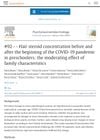 121 citations,
November 2020 in “Endocrine”
121 citations,
November 2020 in “Endocrine” Male hormones like testosterone may make COVID-19 worse, and testing for sensitivity to these hormones could help predict how severe a patient's symptoms might be. Treatments that reduce these hormones are being explored.

The case shows the difficulty in diagnosing certain conditions when standard tests are negative.
[object Object]  January 2018 in “Computational Toxicology”
January 2018 in “Computational Toxicology” Pharmacophore models can predict liver toxicity and central nervous system toxicity, but they have limitations and specific requirements.
11 citations,
January 2020 in “Journal of Drugs in Dermatology” Intralesional triamcinolone acetonide is effective and safe for treating early to mid-stage traction alopecia.
 4 citations,
June 2022 in “BioMed Research International”
4 citations,
June 2022 in “BioMed Research International” Using mesenchymal stem cells or their exosomes is safe for COVID-19 patients and helps improve lung healing and oxygen levels.
 January 2023 in “Social Science Research Network”
January 2023 in “Social Science Research Network” The document doesn't say if the treatment for hair loss worked.
 71 citations,
April 2020 in “Journal of Cosmetic Dermatology”
71 citations,
April 2020 in “Journal of Cosmetic Dermatology” Genetic differences may affect COVID-19 deaths; anti-androgens could be potential treatment.
 50 citations,
March 2017 in “PeerJ”
50 citations,
March 2017 in “PeerJ” Using finasteride or dutasteride may cause long-lasting erectile dysfunction.
 February 2024 in “Psychoneuroendocrinology”
February 2024 in “Psychoneuroendocrinology” The COVID-19 pandemic did not significantly change stress levels in preschoolers, but higher-income families' children showed higher stress.
 1 citations,
November 2022 in “Anais Brasileiros de Dermatologia”
1 citations,
November 2022 in “Anais Brasileiros de Dermatologia” Many hospitalized children with COVID-19 had skin, mouth, or nail changes, with skin rashes being common.
 1 citations,
April 2021 in “Clinical and Experimental Dermatology”
1 citations,
April 2021 in “Clinical and Experimental Dermatology” The COVID-19 pandemic has caused a 57% increase in interest in facial cosmetic procedures, leading to calls for better industry regulation and professional standards.
 September 2022 in “Journal of The American Academy of Dermatology”
September 2022 in “Journal of The American Academy of Dermatology” Different types of hair loss are linked to COVID-19, with some types possibly increasing risk of getting the virus, while others may be triggered or worsened by the virus.
 43 citations,
October 2003 in “Journal of The American Academy of Dermatology”
43 citations,
October 2003 in “Journal of The American Academy of Dermatology” Hair transplanting is a useful, often overlooked treatment for female pattern hair loss.
 12 citations,
November 2021 in “Journal of Clinical Medicine”
12 citations,
November 2021 in “Journal of Clinical Medicine” Kidney transplant patients who had COVID-19 experienced a significant drop in their quality of life due to long-lasting symptoms.
 August 2021 in “Journal of skin and stem cell”
August 2021 in “Journal of skin and stem cell” Skin symptoms could help in early COVID-19 diagnosis but more research is needed to confirm their reliability.
 3 citations,
May 2021 in “British Journal of Dermatology”
3 citations,
May 2021 in “British Journal of Dermatology” The COVID-19 pandemic led to fewer skin checks and skin cancer diagnoses in Australia in 2020.
[object Object]  6 citations,
June 2016 in “Experimental Dermatology”
6 citations,
June 2016 in “Experimental Dermatology” Frontal Fibrosing Alopecia is a poorly understood condition that is hard to treat and causes distressing hair loss.

Topical Minoxidil is effective for hair loss after COVID-19.
 January 2021 in “Erciyes medical journal”
January 2021 in “Erciyes medical journal” The COVID-19 pandemic changed the types of skin conditions seen at a clinic, with fewer patients and varying numbers of specific conditions.
 88 citations,
May 2012 in “Human Reproduction Update”
88 citations,
May 2012 in “Human Reproduction Update” Women with PCOS may take longer to get pregnant but can have a normal family size, and should manage their overall health to reduce long-term health risks.
 1 citations,
September 2020 in “Journal of the Endocrine Society”
1 citations,
September 2020 in “Journal of the Endocrine Society” Men have worse COVID-19 outcomes than women due to genetic and hormonal differences.
 42 citations,
April 2021 in “Journal of clinical pharmacology”
42 citations,
April 2021 in “Journal of clinical pharmacology” Baricitinib helps treat several diseases, including COVID-19, but has side effects and needs careful monitoring.

Sex hormones may affect COVID-19 severity and outcomes.
 3 citations,
July 2018 in “Cureus”
3 citations,
July 2018 in “Cureus” A breast cancer patient had lasting hair loss after chemotherapy, which improved with minoxidil treatment.

Platelet-rich plasma injections effectively treat hair loss in both men and women, increasing hair density with high patient satisfaction and no significant side effects.
 April 2024 in “The Egyptian Family Medicine Journal/The Egyptian Family Medicine Journal ”
April 2024 in “The Egyptian Family Medicine Journal/The Egyptian Family Medicine Journal ” Vitamin D supplements significantly improved post-COVID-19 symptoms in deficient patients.
 21 citations,
February 2021 in “BMJ case reports”
21 citations,
February 2021 in “BMJ case reports” Anabolic steroid users may face higher risk of severe COVID-19.
 December 2023 in “Health Information Jurnal Penelitian”
December 2023 in “Health Information Jurnal Penelitian” Post-COVID syndrome causes long-lasting symptoms like fatigue, breathing issues, and anxiety.
 5 citations,
May 2020 in “Journal of The American Academy of Dermatology”
5 citations,
May 2020 in “Journal of The American Academy of Dermatology” Hydroxychloroquine might help prevent COVID-19, but more research is needed.



























